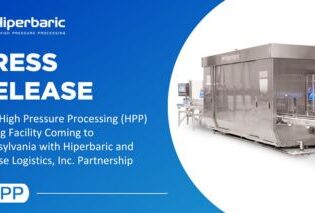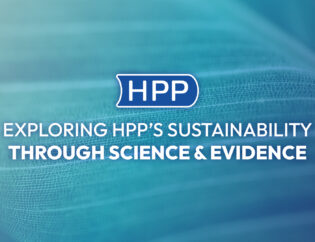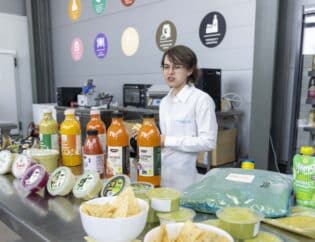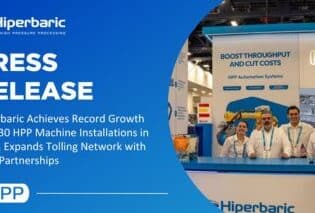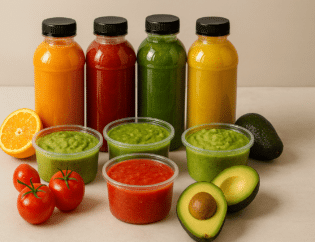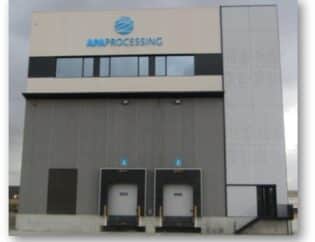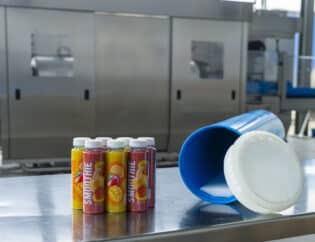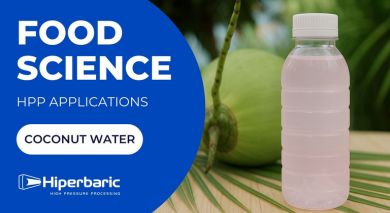
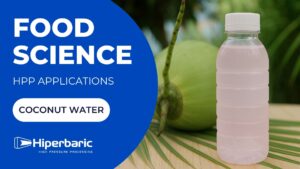
The growing global demand for coconut water has prompted researchers to explore innovative preservation methods that maintain its fresh-like qualities while extending shelf life. A recent study, “Nonthermal preservation of coconut water by forward osmosis concentration and high pressure processing“, presents a promising solution that combines forward osmosis (FO) and high pressure processing (HPP) to preserve coconut water without thermal treatment.
Addressing Key Safety Concerns
Coconut water’s popularity as a natural isotonic beverage continues to rise due to its unique sugar-electrolyte composition and health-promoting properties. However, safety concerns have historically limited HPP applications for coconut water.
Since 2015, when the FDA raised concerns about Clostridium botulinum risks in HPP coconut water, manufacturers have grappled with finding solutions that address safety while maintaining coconut water’s delicate flavor profile. The key issue: coconut water is generally a low-acid beverage (pH > 4.6), and HPP alone doesn’t inactivate C. botulinum spores that could potentially grow during refrigerated storage.
The new study by Punzalan, Marcelo, and Padilla-Zakour presents a significant advancement in addressing this challenge through a multi-hurdle approach.
The Innovative Multi-Hurdle Solution
The researchers employed a two-step process with a critical acidification step:
- Forward Osmosis Concentration: Coconut water was concentrated from 6.6 °Brix to approximately 23 °Brix using food-grade potassium lactate as the draw agent, reducing product volume by 3.5 times.
- Acidification: The concentrate was acidified to pH 4.6 with malic acid—precisely at the critical threshold that prevents C. botulinum spore outgrowth.
- High Pressure Processing: The acidified concentrate was treated at 600 MPa for 2 minutes at 4°C, achieving the food safety requirements for acidified juices.
This approach directly addresses the safety concerns identified in Hiperbaric’s extensive research on C. botulinum in coconut water.
Impressive Safety and Stability Results
The HPP validation demonstrated a 5-log reduction of pathogenic microorganisms, including E. coli O157:H7, Salmonella, and Listeria monocytogenes, meeting FDA requirements for juice safety. During 18 weeks of refrigerated storage, the concentrate maintained stable physicochemical properties with no detectable microbial growth.
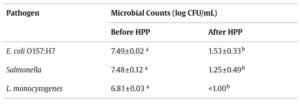
Most notably, the pH remained consistent between 4.56-4.63 throughout the storage period, ensuring the critical control point for C. botulinum remained effective. This stability reinforces that properly acidified HPP coconut water concentrates can maintain both safety and quality over extended refrigerated storage.
Sensory Quality Preserved
Consumer acceptability testing with 101 panelists revealed that the reconstituted FO-HPP coconut water received favorable ratings for appearance, aroma, flavor, mouthfeel, and overall liking. In fact, the increased clarity resulting from the FO process led to higher appearance ratings compared to untreated samples.
These results align with the industry’s experience that HPP coconut water can deliver the refreshing taste and nutritional benefits that closely resemble freshly cracked coconuts—a quality that thermal processing struggles to maintain.
Industry Implications
This combined approach offers several advantages for coconut water producers:
- Addresses FDA Safety Concerns: The acidification to pH 4.6 addresses the specific C. botulinum risk that led to FDA warnings in 2015
- Volume Reduction: The 3.5-fold reduction in volume can significantly lower transportation and storage costs
- Extended Shelf Life: At least 18 weeks of refrigerated stability without thermal treatment
- Retained Nutrients: Minimal changes to the nutritional profile compared to fresh coconut water
- Consumer Acceptance: Favorable sensory attributes in the reconstituted product
The study represents an important step forward for manufacturers seeking to bring HPP coconut water safely to market while preserving its delicate sensory qualities.
Future Directions
As Hiperbaric’s ongoing research continues to identify intrinsic factors beyond pH that influence C. botulinum growth in coconut water, future preservation strategies may become even more refined. The researchers suggest that incorporating additional nonthermal pre-treatments, such as ultrafiltration, could help reduce enzyme activity and further improve product quality during storage.
This study demonstrates how the industry is successfully addressing both regulatory concerns and technical challenges to meet consumer demand for minimally processed beverages.




